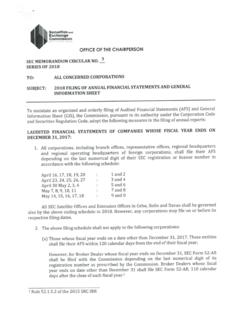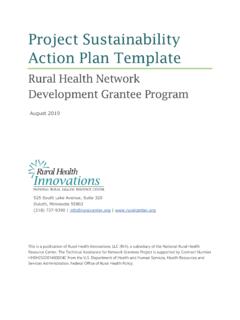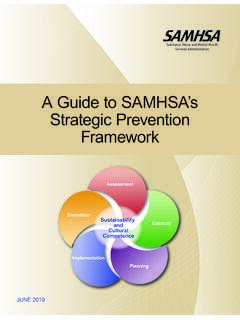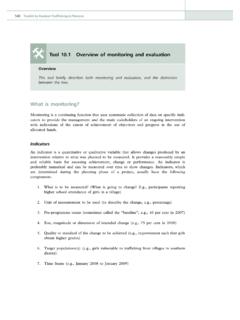Transcription of Sustainability Reporting Guidelines for
1 Sustainability Reporting Guidelines for Publicly Listed Companies INTRODUCTION. In recent years, increased focus has been placed on companies to provide greater disclosure and transparency not only on financial matters but on non-financial and Sustainability issues, as well. Companies' stakeholders now give greater attention to how businesses impact the economy, environment and society and the way corporations respond to Sustainability challenges, in addition to financial challenges, determines their long-term viability and competitiveness. Consequently, Sustainability Reporting has emerged as a common practice for companies globally. In fact, 93% of the world's largest 250 companies and 75% of the top 100 companies in 49 countries report on , for the Philippines, less than 22% of publicly-listed companies have published a report on Sustainability impacts and The need to promote Sustainability Reporting to Philippine companies served as the impetus for the SEC to include Principle 10 in the Code of Corporate Governance for Publicly-Listed Companies (PLCs) stating that companies should ensure that material and reportable non-financial and Sustainability issues are disclosed.
2 Recommendation of the same Code further provides as follow: The board should have a clear and focused policy on the disclosure of non- financial information, with emphasis on the management of economic, environmental, social and governance (EESG) issues of its business, which underpin Sustainability . Companies should adopt a globally recognized standard/framework in Reporting Sustainability and non-financial issues.. To further increase awareness among Philippine PLCs on Sustainability Reporting , the SEC is releasing this Guidelines on Sustainability Reporting . This Guidelines is crafted with the following objectives: Make Sustainability Reporting relevant and value adding for Philippine PLCs Help PLCs to identify, evaluate and manage their material Economic, Environmental and Social (EES) risks and opportunities Help PLCs to assess and improve their non-financial performance across EES aspects of their organization to optimize business operations, improve competitiveness, and long-term success Provide a mechanism that would allow PLCs to communicate with its stakeholders, including investors or its potential investors 1.
3 The Road Ahead. The KPMG Survey of Corporate Responsibility Reporting 2017. 2. Based on disclosures made by publicly-listed companies on their Integrated Annual Corporate Governance Report (I-ACGR), 58 companies out of 270 have published a Sustainability Report 1. Enable PLCs to measure and monitor its contributions towards achieving universal targets of Sustainability , such as the United Nations Sustainable Development Goals (UN SDG), as well as national policies and programs, such as AmBisyon Natin 2040. The Guidelines recognizes that Sustainability Reporting is a journey and that the PLCs would be at different levels in this journey; while some may already be advanced, most are just beginning. As such, this Guidelines may be seen as an introductory tool for those companies who are just starting on their journey.
4 Please note that companies are not required to disclose on all topics provided in the Reporting Template (Annex A of the Guidelines ). Rather, disclosure should only be on topics determined by companies as material after an assessment of materiality, which is discussed in more detail in the Materiality Assessment section. Nevertheless, companies are encouraged to move at any time beyond and disclose more information than that required under this Guidelines , especially other initiatives which the company considers as contributing to the UNSDG. For other companies already Reporting in accordance with internationally recognized Sustainability frameworks or standards, their Sustainability reports shall be considered as their compliance.
5 However, they are encouraged to use this as a guide, particularly for climate-related disclosures. Sustainability AND Sustainability Reporting . Sustainability is defined as development that meets the needs of the present without compromising the ability of future generations to meet their own needs .3 It focuses on how a company manages its economic, environmental and social impacts, risks and opportunities. Disclosure on these non-financial matters are done through Sustainability Reporting (also known as EESG (economic, environmental, social and governance) Reporting , non-financial Reporting , or triple bottom line accounting), which is a central element of modern corporate Reporting that includes strategy, governance and performance.
6 Sustainability Reporting is an organization's practice of Reporting publicly on its significant economic, environmental and/or social impacts, in accordance with globally accepted standards. Such disclosures enable organizations to measure, understand and communicate their EESG performance and then set goals, and manage change more Often, they go hand in hand with the setting of performance targets related to EESG impacts. Sustainability Reporting also benefits stakeholders interested in an organization's ability to create value over time, including employees, customers, suppliers, investors, business partners, local communities, legislators, regulators, and policy makers. This promotes transparency and accountability, empowering stakeholders to make informed decisions and helps the company manage its EESG impacts.
7 Globally Recognized Standards/Frameworks in Reporting Sustainability This Guidelines provides a Sustainability Reporting Framework for Philippine PLCs that builds upon four of the globally accepted frameworks, which companies use to report on Sustainability and non-financial information - the Global Reporting Initiative's (GRI) Sustainability Reporting Standards, the International Integrated Reporting Council's (IIRC) Integrated Reporting (IR) Framework, the Sustainability Accounting 3. Brundtland, G. Our Common Future , Report of the World Commission on Environment and Development (1987). 4. Global Reporting Initiative, About Sustainability Reporting , Reporting / accessed on 05 December 2018. 2. Standards Board's (SASB) Sustainability Accounting Standards, and the recommendations of the Task Force on Climate-related Financial Disclosure (TCFD)5.
8 The GRI Standards has a comprehensive Reporting requirement covering governance, economic, environmental, and social topics. It is also aligned with international standards and normative frameworks such as the United Nations Global Compact (UNGC) and the International Labour Organization (ILO). Tripartite Declaration. The <IR> Framework defines six capitals, seven guiding principles, and eight content elements of an integrated report but does not specify topic disclosures and measurement methods. It aims to monitor how the capitals are used and created by the business model and discloses the companies' strategies in light of risks and outlook. The SASB Standards provides industry-based Sustainability standards for more than 77 specific industries.
9 It has five general Sustainability themes including environment, social capital, human capital, business model and innovation, and leadership and governance. To address Sustainability issues, a minimum set of topics for consideration in each industry are also provided, together with quantitative and comparable accounting The TCFD a private-sector task force created by the Financial Stability Board issued its final recommendations on climate- related financial disclosure in June 2017, focusing on climate-related risks, opportunities, and financial impacts, as well as scenario The Task Force's recommendations apply to non-financial companies and financial-sector organizations, including banks, insurance companies, asset managers and asset owners.
10 The table below distinguishes the Reporting standards/frameworks and compares the guiding principles for defining report content and Sustainability topics covered in each standard/framework. More information can be found in the full guidance documents for these Reporting standards/frameworks that can be access via their websites. Coverage Reporting Standards/Frameworks GRI IR Framework SASB TCFD. General Economic Six Capitals: Business model Governance of Sustainability Manufactured and innovation climate-related Topics Environmental capital issues Leadership and Social Financial governance Impact of Governance capital climate-related Human capital issues on strategy Intellectual Social capital and financial capital planning Environment Human capital Management of Social and climate-related relationship risks capital 5.















